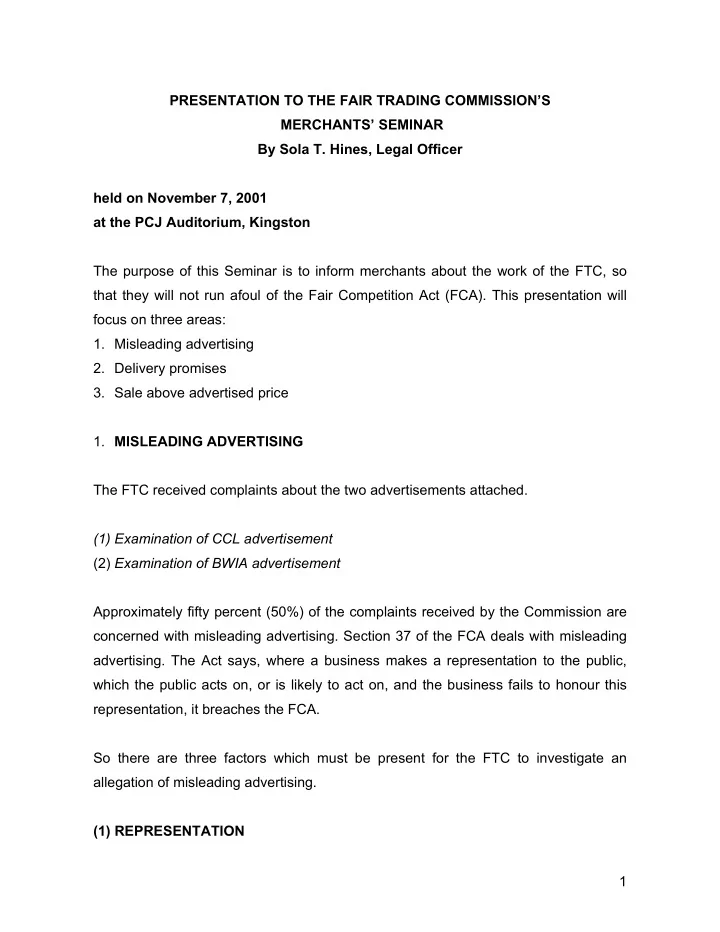

PRESENTATION TO THE FAIR TRADING COMMISSION’S MERCHANTS’ SEMINAR By Sola T. Hines, Legal Officer held on November 7, 2001 at the PCJ Auditorium, Kingston The purpose of this Seminar is to inform merchants about the work of the FTC, so that they will not run afoul of the Fair Competition Act (FCA). This presentation will focus on three areas: 1. Misleading advertising 2. Delivery promises 3. Sale above advertised price 1. MISLEADING ADVERTISING The FTC received complaints about the two advertisements attached. (1) Examination of CCL advertisement (2) Examination of BWIA advertisement Approximately fifty percent (50%) of the complaints received by the Commission are concerned with misleading advertising. Section 37 of the FCA deals with misleading advertising. The Act says, where a business makes a representation to the public, which the public acts on, or is likely to act on, and the business fails to honour this representation, it breaches the FCA. So there are three factors which must be present for the FTC to investigate an allegation of misleading advertising. (1) REPRESENTATION 1
There must be a representation to the public. What is a representation? It can be an advertisement, a sign in a business place, words on a receipt, a billboard or statements from staff members. The representation may be express or implied, or there may be omission of information. The Commission considers the entire advertisement, transaction or course of dealing. (2) THE REPRESENTATION AFFECTS THE PUBLIC’S BEHAVIOUR The Commission examines the representation to see whether or not it is likely to affect consumers’ choices. That is, would the consumer have chosen differently but for the misleading representation? This test determines whether the representation is material. On the face of it, certain information is considered material, those relating to price, health, safety, warranties and guarantees, quality and effectiveness of the goods. (3) THE REPRESENTATION IS NOT HONOURED Where the consumer does not get the goods or services advertised, Section 37 of the FCA is breached. In many instances, such as the two examples examined earlier, the businesses co- operate with the Commission, and the matter is amicably settled. As a matter of last resort, the Commission will apply to the Courts for a fine to impose against the business. FINE PRINT Businesses should also note that the fact that there is a disclaimer such as “Conditions Apply” at the foot of the page, will not prevent an otherwise misleading advertisement from being misleading. The Commission looks at the totality of the advertisement, the juxtaposition of words and phrases, the use of photographs, and 2
such other factors in determining whether the advertisement is likely to mislead consumers. 2. DELIVERY PROMISES In recent times, the FTC has received complaints from consumers who shop at businesses which sell goods, and offer to deliver them to their customers. The customers pay a deposit, or pay in full, and a promise is made to deliver the goods within a few days. Sometimes it takes months for the goods to be delivered. These complaints are most prevalent during the Christmas season, when it seems the demand is greater than the supply of the goods. The Commission considers this a breach of Section 37. The representation is the promise to deliver the good within the stated period. The consumer chooses this business because it has the good. He could easily have taken his patronage elsewhere. 3. SALE ABOVE ADVERTISED PRICE Recently the Commission received the following complaint: The complaint The Informant alleged that on presenting a prescription to be filled, she was charged $164.90 for a drug—Dequacaine, an over-the-counter drug—which was being displayed on the shelf for $149.50. She was told after the purchase that the additional cost of $15.40 was because the item was dispensed pursuant to a prescription. Findings The Staff of the Commission was informed by the Pharmaceutical Society of Jamaica that once a prescription is tendered, the pharmacist has a professional responsibility to ensure the correct drug and dosage, identification of drug interactions and appropriate instructions given to patients; pharmacists charge a professional fee for these services. Also as long as a drug is sold pursuant to a prescription, the fee is charged even if the drug is an over-the-counter drug. The professional fee is however not shown separately from the cost of the drugs on consumers’ bills. 3
FTC’s directive The Respondent was advised to: • either waive the professional fees applied to over-the-counter drugs when such drugs are dispensed pursuant to a prescription; or indicate on customers’ bills professional fees separately from the cost of the over-the-counter drugs when such drugs are dispensed pursuant to a prescription; and • indicate on customers’ bills professional fees separately from the cost of drugs that are not available as over-the-counter drugs and so are only dispensed pursuant to a prescription. In summary the consumer complained that the pharmacy was selling the good above the advertised price. This is a breach of Section 41 of the FCA. The Act states that in investigating this offence, the Commission should look at the period for which the advertisement relates, such as a sale. Also, where the advertisements are in a catalogue, and it is stated prominently that the prices are subject to error, the business would not have breached the Act if it does not sell at the erroneous price. Further, where the erroneous advertisement is quickly corrected by another advertisement, the business will not be deemed to have breached the Act. CONCLUSION The primary function of the Staff of the FTC is to ensure that the provisions of the FCA are not breached. In recognition of this function, we have a mandate to educate consumers and businesses about the FCA. We encourage businesses to seek our advice when in doubt. For example, send over draft promotional material for us to vet. We would much rather assist and educate than prosecute. - Sola T. Hines November 7, 2001 4
Recommend
More recommend